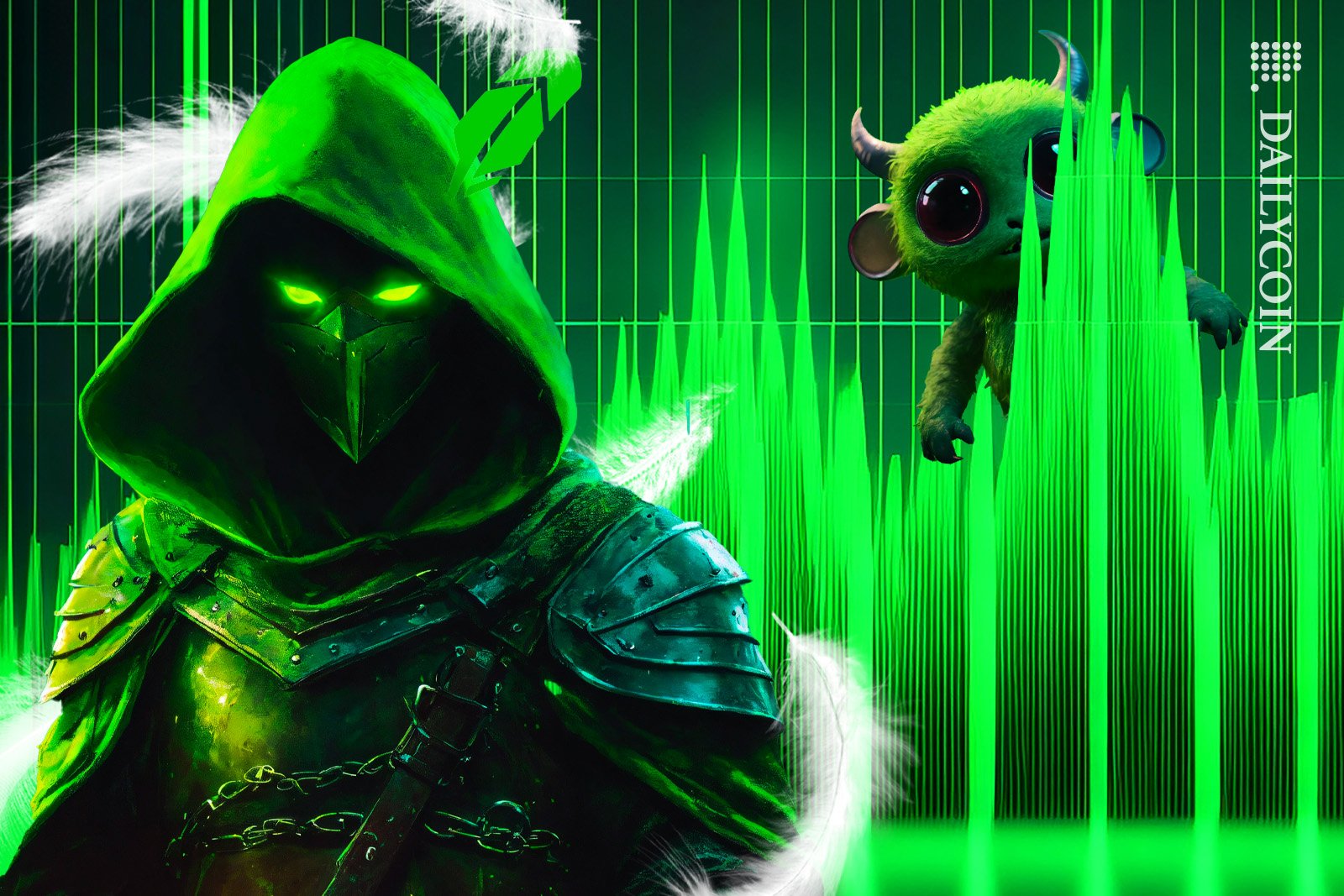
Which of these two well-trusted trading platforms comes out on top in this in-depth head-to-head comparison? Let’s find out.
There is an ever-increasing number of crypto trading platforms available to anyone, and choosing the right one can be tricky if you do not have all the facts. Two of the most well-known names out there are eToro and Robinhood. Both have well-established user bases in the millions, so which one should you choose?
Sponsored
Have no fear; by the end of this article, you will have enough information to decide to choose the right crypto trading platform for you.
eToro vs. Robinhood Overview
Let’s first have a look at the history of each company.
eToro from Crypto Trading
Established in Tel Aviv, Israel, in 2007, eToro was founded by Yoni and Ronen Assia; it has global offices in the US, UK, Australia, and Cyprus.
By mixing social media and investing, eToro has positioned itself as the world’s only “social investing platform.” eToro has around 80 cryptocurrencies available to buy and trade, along with many traditional stocks and commodities (Apple, Tesla, Gold, Oil, etc).
Sponsored
As of August 2023, eToro had 32 million users, trading in 70 countries.
Sign up for eToro US
Sign up for eToro Worldwide
Robinhood for Crypto Trading
In contrast, Robinhood is six years younger, founded in New York City in 2013 by Vladimir Tenev and Baiju Bhatt. Their ethos, taken from the old English story of the same name, hints at taking from the wealthy to give to the poor, in their case, to “democratize finance for all.”
Like eToro, Robinhood offers trading in crypto, stocks, and commodities. However, the amount of crypto available on Robinhood is minimal; it is currently around 25 cryptocurrencies.
Robinhood focuses on trading as a whole; the crypto element is a small but growing sector.
As of 2023, Robinhood’s user base is 10.8 million globally (fallen highs of 22.5 million in 2021).
Both platforms have website and app versions.
Note: when a well-known platform only has limited cryptocurrencies available, this usually reflects how well-vetted each of them is. To me, this increases the trust I have in the platform.
Key Differences: eToro vs. Robinhood
Now that we know their backgrounds, let’s jump in and look at each area you must consider when choosing a crypto trading platform.
Fee Comparison Between eToro and Robinhood
Transaction fees are among the most obvious deciding factors when choosing a crypto trading platform. More often than not, trading platform fees are higher than centralized exchanges like Binance or Kraken. Robinhood seems to understand this bottleneck.
- Robinhood
- Trading fees: 0%
- Withdrawal Fees: 0%
- eToro
- Trading fees: 1%
- Withdrawal fees: 2%
Fees on Robinhood
One of Robinhood’s strongest features is its zero percent commission on trades (including crypto trades).
Fees on eToro
eToro has a flat fee of 1% for all crypto trades. While 1% doesn’t seem like a lot, this can be a sizeable chunk of your cash for higher-value trades.
Based on this fact, Robinhood takes the win here. But what about withdrawal fees?
Withdrawal Fees
At some point, you will want to get your fiat currency off your trading platform, and withdrawal fees can sometimes take a dent in your haul. eToro charges 2% to withdraw fiat currencies to your bank account. Robinhood brings it home again with 0% withdrawal fees.
A second win for Robinhood.
Deposit Methods
Neither platform won’t be useful if you can’t get your fiat currency onto the platform in the first place, so let’s look at their deposit methods.
Deposit Methods on eToro
eToro understands that convenient methods of depositing your fiat currency are important. They offer more deposit methods than Revout. Bank transfers are available but can take a few days. Credit/debit cards, Paypal, Skrill, and Klarna (amongst others) are the more immediate methods available.
Deposit methods on Robinhood
Robinhood lets themselves down here, only offering bank transfers as a deposit method. While this may not seem like a big issue, new users are likelier to find another platform if this first hurdle is big.
Massive win for eToro!
Range of Crypto Available
While crypto data firm CoinMarketCap lists over 9,000 cryptocurrencies, 99% of investors don’t need (or want) anywhere near that many! The majority of crypto investments and trades feature the more well-known cryptos.
For this reason, having a small number of cryptocurrencies available is often the norm for trading platforms. This is true of both eToro and Robinhood.
- eToro has 80+ cryptocurrencies for trading.
- Robinhood only has around 25.
While these numbers often change, both platforms offer the most well-known and trusted cryptocurrencies; you won’t find dodgy coins on either platform.
However, given the slightly more extensive range, I will give this win to eToro. This is because Robinhood doesn’t offer three of the most popular cryptocurrencies: Cardano, Polygon, and Solana.
Signup and KYC Procedures
As with all trading platforms, you’ll have to open an account and perform KYC (Know Your Customer) verification. This is nothing to worry, and it helps keep bad actors out of the space.
The sign-up on both eToro and Robinhood only takes a few minutes and isn’t too taxing. The differences come with the KYC verification.
You must complete KYC verification before you can start trading.
If you’re unfamiliar with KYC verification, you must provide personal information (address, etc.) and a picture of your government ID (Driver’s license, Passport, etc).
KYC verification on eToro took about a day and a half to come through, but Robinhood is notorious for taking much longer; even their website states, “it may take 5-7 days”.
Due to the speed of KYC verification, eToro takes the win here.
Products and Services
Let’s get down to the nitty-gritty. How do eToro and Robinhood stack up against each other in terms of products and services?
For the sake of sticking with the narrative of this article (which one is better for crypto), I shall stick to their crypto offering; suffice to say that both platforms offer many trading options, including stocks and Exchange Trade Funds (ETFs).
Both are very similar platforms offering a similar experience for crypto trading.
Products and Services on Robinhood
Robinhood is only available in the United States. However, they are currently (early 2024) in the process of opening up for UK customers.
Robinhood’s educational resource, Robinhood Learn, comprises introductory trading and investment articles.
Products and Services on eToro
In contrast to Robinhood, eToro is available in over 70 countries globally.
The eToro Academy contains a wealth of knowledge in articles, trading courses, and webinars designed to give even the newest users the knowledge they need to understand how to trade crypto.
The user experience is also very similar. Both platforms market themselves to users of all levels, but from my experience, users with some prior trading knowledge would fare better on both eToro and Robinhood.
eToro wins this section due to its advanced academy and availability in many more locations.
Note: There are much easier-to-use trading platforms for the new user (e.g., Nexo and Swissborg).
Unique Features
Both platforms have a similar mission, investment, and trading, but what does each do differently?
Unique Features on eToro
eToro’s strength comes from its position as a social trading platform; it has a very large community of users. New users can learn from other, more experienced users using its well-known CopyTrader function.
This tool enables users to emulate successful traders’ investment strategies for free. However, this can be confusing for users with limited investment knowledge.
Note: Instead of jumping headlong into your first investment by merely imitating others, keeping it simple and only in investments or trades that you understand is crucial.
eToro also integrates charts from the well-known trading data platform TradingView, providing real-time data and allowing traders to make educated decisions when buying crypto and other assets.
eToro also offers a free virtual portfolio for new users to dip their toes into crypto trading without risking their hard-earned, real-life cash.
Unique Features of Robinhood
Robinhood’s key feature is its fees, or rather lack thereof. Zero percent fees on both trades and withdrawals are very attractive.
While not necessarily a crypto feature, Robinhood lets users participate in a company’s initial public offering or IPO. This has typically been reserved for financial institutions.
That said, eToro is the clear winner here.
Robinhood vs. eToro: Head-to-Head
Let’s look at Robinhood and eToro side by side. Here are the facts:
| eToro | Robinhood | |
| Founded | 2007 | 2013 |
| Users | 32 million | 10.8 million |
| Cryptos | 80+ | 25+ |
| Trading Fees | 1% | 0% |
| Withdrawal Fees | 2% | 0% |
| KYC Required | Yes | Yes |
| Deposit Options | Bank Transfers, Credit/Debit Card, PayPal, Skrill, Klarna etc | Bank Transfers |
| Unique Features | Copy Trading, Academy, Social Interactions, Trading View Charts | Zero percent fees on both trading and withdrawals |
| Best For? | New and experienced traders looking for a robust trading platform with social media-like aspects | More experienced traders and investors who require less guidance |
Why Robinhood Is Better than eToro
It all comes down to fees. Zero percent fees on trades and withdrawals is a huge selling point, but is it enough to compensate for losses elsewhere?
Why eToro is Better than Robinhood
It has a broader range of cryptocurrencies and is available in more countries. It has a faster verification process, social trading options, educational material, more deposit methods, and a free virtual portfolio for new users. It is an extensive list of wins for eToro.
Sign up for eToro US
Sign up for eToro Worldwide
On the Flipside
- While eToro and Robinhood are great platforms, there are many other options. If you are a more experienced trader, choose a centralized exchange like Binance, OKX, or Coinbase. If you are only interested in crypto and want an easy-to-use app, you might prefer some centralized finance apps like Nexo and Swissborg.
Why This Matters
It is critical to understand what platforms offer and who they are suited to when choosing a crypto trading platform. Diving into a platform without researching it first is nearly as bad as buying crypto without knowing anything about it.
FAQs
Yes, eToro is a complete trading platform. It includes a social aspect, copy trading, and an extensive library of academy articles, courses, and webinars designed to educate you on how best to buy and trade crypto.
Yes, but given the limited educational resources and minimal range of available cryptocurrencies, better options are available elsewhere.
It depends on your understanding and experience; for newer investors, eToro stands head and shoulders above Robinhood as a crypto trading platform in nearly all areas except for fees. However, Robinhood does offer a strong portfolio of non-crypto options and IPO access if that’s what you are looking for.
